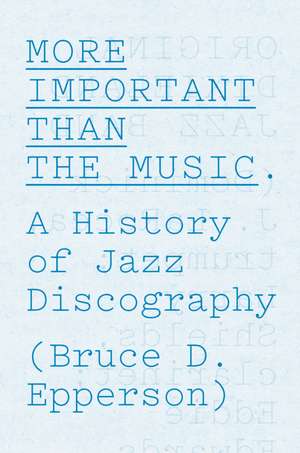More Important Than the Music: A History of Jazz Discography
Autor Bruce D. Eppersonen Limba Engleză Hardback – 17 oct 2013
Today, jazz is considered high art, America’s national music, and the catalog of its recordings—its discography—is often taken for granted. But behind jazz discography is a fraught and highly colorful history of research, fanaticism, and the intense desire to know who played what, where, and when. This history gets its first full-length treatment in Bruce D. Epperson’s More Important Than the Music. Following the dedicated few who sought to keep jazz’s legacy organized, Epperson tells a fascinating story of archival pursuit in the face of negligence and deception, a tale that saw curses and threats regularly employed, with fisticuffs and lawsuits only slightly rarer.
Epperson examines the documentation of recorded jazz from its casual origins as a novelty in the 1920s and ’30s, through the overwhelming deluge of 12-inch vinyl records in the middle of the twentieth century, to the use of computers by today’s discographers. Though he focuses much of his attention on comprehensive discographies, he also examines the development of a variety of related listings, such as buyer’s guides and library catalogs, and he closes with a look toward discography’s future. From the little black book to the full-featured online database, More Important Than the Music offers a history not just of jazz discography but of the profoundly human desire to preserve history itself.
Preț: 282.94 lei
Preț vechi: 327.56 lei
-14% Nou
Puncte Express: 424
Preț estimativ în valută:
54.18€ • 55.83$ • 45.47£
54.18€ • 55.83$ • 45.47£
Carte indisponibilă temporar
Doresc să fiu notificat când acest titlu va fi disponibil:
Se trimite...
Preluare comenzi: 021 569.72.76
Specificații
ISBN-13: 9780226067537
ISBN-10: 022606753X
Pagini: 304
Ilustrații: 11 halftones
Dimensiuni: 152 x 229 x 25 mm
Greutate: 0.55 kg
Ediția:New.
Editura: University of Chicago Press
Colecția University of Chicago Press
ISBN-10: 022606753X
Pagini: 304
Ilustrații: 11 halftones
Dimensiuni: 152 x 229 x 25 mm
Greutate: 0.55 kg
Ediția:New.
Editura: University of Chicago Press
Colecția University of Chicago Press
Notă biografică
Bruce D. Epperson is an attorney and independent scholar and member of the Association for Recorded Sound Collections. He is the author of Peddling Bicycles to America: The Rise of an Industry. He lives in Miami.
Cuprins
List of Illustrations
Preface and Acknowledgments
1 The Sage of Edgware
2 “Those Frenchmen Got a Hellova Nerve”
3 “A Form of Musical Bookkeeping”
4 “You Live in a Numerical World of Your Own”
5 “What a Mess”
6 Specialized Discographies, Part 1
7 Specialized Discographies, Part 2
8 What Kind of Discographies Do We Want?
Notes to Pages
Bibliography
Index
Preface and Acknowledgments
1 The Sage of Edgware
2 “Those Frenchmen Got a Hellova Nerve”
3 “A Form of Musical Bookkeeping”
4 “You Live in a Numerical World of Your Own”
5 “What a Mess”
6 Specialized Discographies, Part 1
7 Specialized Discographies, Part 2
8 What Kind of Discographies Do We Want?
Notes to Pages
Bibliography
Index
Recenzii
“In addition to being a superb researcher, Epperson is also an engaging storyteller and he makes these historic figures come alive through their own words and actions.”
“We don’t normally review other publishers’ titles, but this one is exceptional. . . . Although Bruce covers only jazz discography, the issues he examines —including copyright and plagiarism, validity of sources, the need for better documentation, intramural squabbling, and adaptation in the digital age—will be of interest to collectors in all fields. It’s a great read.”
“On the surface, More Important Than the Music is an esoteric book, but Epperson has successfully managed to breathe life into the subject, weaving a story that opens up the field to a broader base of interest. He deals in fine detail with the origins and development of jazz discography, providing fascinating personal background on the major figures as well as addressing foundational issues such as plagiarism. A major contribution to jazz studies.”
“Jazz discography is a home-grown science that evolved side by side with recording technology as well as the music itself. Counting both fanatical collectors and experienced scholars among its ranks, its practitioners have served as detectives, catalogers, musicologists, and historians. Over the course of nearly a century, they have created a body of knowledge that not only provides access to the music but also presents the possibility of analyzing and understanding the music on a larger scale. With jazz studies becoming more established in academia, there is a crucial need to understand its history. Epperson has presented the fascinating story of the field of jazz discography, clearly showing its development by illuminating the significant contributors and their projects.”
“Epperson has produced a solidly researched work that traces the evolution of jazz discography from its humble beginnings as a hobbyist’s pastime and skillfully analyzes the issues confronting all discographers, past, present, and future—from plagiarism, copyright issues, and validity of sources to adaptation in the digital age.”
“For many who think of jazz as captivating sound, alluring rhythm, and charismatic style, jazz discography might seem like a soulless business conducted by grim introverts obsessing over record matrix numbers. Epperson knows this, but he also knows that a certain group of people who have approached jazz with a ‘passionate attention to facts’ regarding its recorded history have been absolutely critical to the life of the music—critical, that is, because the acts of producing, distributing, collecting, and listening to jazz records are themselves primary acts of jazz interpretation, evaluation, canon building, and meaning making. Epperson, a scrupulous bibliophile who writes with a lucid and graceful clarity, has given us a fascinating book, a book that conceives of jazz as a field of music that is also a field of knowledge. More Important Than the Music not only opens our eyes to the importance of jazz discography; it also charms us with its deft portraits of the nerdiest of jazz nerds in all of their eccentric, indispensable glory.”
